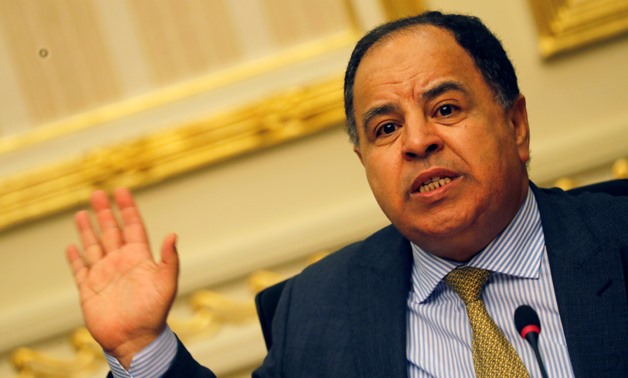
FILE PHOTO: Egypt's Finance Minister Mohamed Maait gestures during a news conference in Cairo, Egypt July 17, 2019. REUTERS/Amr Abdallah Dalsh/File Photo
CAIRO - 2 February 2022: Finance Minister Mohamed Maait said on Wednesday that the 2022/23 fiscal year will see more spending on development investments as part of presidential directives to improve the living conditions of Egyptians.
Speaking at an open dialogue session organized by the Egyptian Manufacturers Association, Maait said the government reduced the total budget deficit by 50 percent over the past five years, adding that the target is to reach 6.7 percent in June and less than 6 percent in the coming fiscal year.
Maait pointed out that the government aims to reduce the debt-to-GDP ratio to less than 90 percent in June, and to less than 85 percent over the next three years, the finance ministry said in a press release.
He noted that the World Bank upped its estimates for the growth of the Egyptian economy by 1 percent to reach 5.5 percent during 2022, while the International Monetary Fund expected the growth of the Egyptian economy to hit 5.6 percent instead of 5.2%.
This reflects solidity and cohesion of the Egyptian economy and its ability to recover from the repercussions of Covid-19, Maait noted.
"The government is serious about stimulating the national industry in all possible ways," he said, citing the imposition of a 50 percent tax cut to encourage investment in some activities in accordance with the Investment Law.
The minister further stressed that the government spares no effort to support exporters, pointing out that LE 31 billion of exporters' arrears have been disbursed so far.
The finance minister called on Egyptian businessmen to integrate the informal sector into the formal economy to collect the dues of the public treasury and increase the gross domestic product.
He pointed out that all tax and customs mechanism projects will be finalized at the end of June, adding that the average customs clearance time was reduced by 50% after applying the single-window system.
Speaking about the e-invoicing system, the minister said that 8,600 companies submitted 23 million e-invoices in January, adding that the average daily rate of e-invoices is expected to reach 2 million in June.
Comments
Leave a Comment